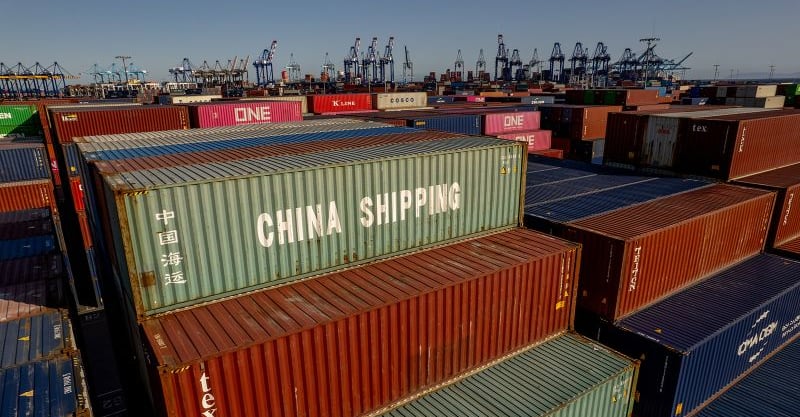U.S. Seeks Trade Talks with China Over Trump's 145% Tariffs Amid Rising Economic Pressures
The Biden administration has reportedly approached China to begin discussions on easing former President Trump’s high tariffs, with Beijing showing cautious openness despite official denials and continued public defiance.
WORLDPOLITICS
Reuters
5/1/20253 min read


The United States has reportedly initiated contact with China through multiple diplomatic and informal channels in a bid to begin discussions on rolling back the 145% tariffs imposed during Donald Trump's presidency, according to a post on Yuyuan Tantian, a social media account affiliated with Chinese state media. While the post cited anonymous sources, the move may indicate early signs of a potential shift in Beijing's trade posture.
U.S. officials, including Treasury Secretary Scott Bessent and White House economic adviser Kevin Hassett, have expressed optimism that progress can be made in de-escalating the long-standing trade war. Speaking to CNBC, Hassett noted that both governments have engaged in “loose discussions,” and pointed to China’s recent reduction of tariffs on select U.S. products as a signal of progress.
China has publicly remained combative. Officials continue to reject what they view as coercive tactics, branding the tariffs as “economic bullying.” Despite this, Reuters recently reported that Beijing quietly compiled a list of U.S. goods—such as certain pharmaceuticals, microchips, and jet engines—that would be exempt from its retaliatory 125% tariffs, a move designed to soften the economic blow at home.
Treasury Secretary Bessent, speaking on Fox Business Network, said that while no formal negotiations have begun, the “mutually damaging” tariff regime needed to be eased as a prerequisite to any serious dialogue. “This will be a multi-step process,” he stated, highlighting a revisit of China’s unmet promises from the 2020 “Phase 1” trade agreement. That deal, struck during Trump’s first term, required Beijing to purchase $200 billion more in U.S. goods and services, though the COVID-19 pandemic undermined those efforts.
Beyond tariff rollbacks, Bessent indicated the U.S. also wants to address deeper trade grievances, including non-tariff barriers and intellectual property theft. “Everything is on the table,” he said.
Economic Pressure Mounting
Economically, both countries are facing increased strain. Nomura Securities has projected that up to 16 million Chinese jobs could be lost if Chinese exports to the U.S. drop by 50% due to prohibitively high tariffs. Bessent emphasized China’s vulnerability, noting it exports five times more to the U.S. than it imports. “Their factories are closing down as we speak,” he said, warning of a looming crisis in Chinese manufacturing as holiday order volumes decline.
Despite these concerns, Beijing remains publicly defiant. The Chinese Foreign Ministry likened giving in to U.S. pressure to “drinking poison,” while insisting that China will only engage in talks that are “equal and mutually respectful.” The Yuyuan Tantian post echoed this sentiment, claiming China is watching carefully to assess the U.S.’s true intentions before committing to any engagement.
"China needs to maintain the initiative in both negotiation and confrontation," the post said. Still, it acknowledged that exploratory contact might be worthwhile—if only to “force out” Washington’s strategic intentions.
Mixed Signals on Diplomacy
Conflicting statements from both sides have muddled the current state of diplomacy. Trump recently claimed in a media interview that Chinese President Xi Jinping had called him to initiate tariff talks. Beijing denied this, accusing Washington of "misleading the public" and reaffirming that no formal negotiations had occurred.
Chinese Foreign Ministry spokesperson Guo Jiakun said on Wednesday: “As far as I know, there have been no consultations or negotiations between China and the U.S. on tariffs.” Despite these denials, Chinese officials continue to stress that the door to dialogue remains open—provided it's built on equality and mutual interest.
While Yuyuan Tantian is not one of China’s most authoritative media outlets, its alignment with the official narrative suggests a deliberate trial balloon approach—testing public and international reactions before any formal policy shift.
Trump, speaking again on Wednesday, insisted there was a “very good chance” a deal could be reached. The same day, President Xi issued a vague but pointed call for Chinese officials to “adjust to changes in the international environment,” though he made no explicit reference to the United States.
The stage appears set for a cautious, multi-layered engagement—but whether it leads to a full-blown negotiation or simply another chapter of strategic posturing remains to be seen.
Photo: gettyimages-220797216
© 2026. Ke Press Global. A Ke Harbor Company. All rights reserved.
FOLLOW KE PRESS GLOBAL ON :
Contact us


